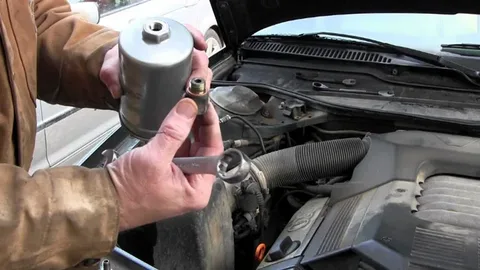In the world of heavy-duty trucking, where every mile counts and downtime are a costly enemy, preventative maintenance reigns supreme. While major overhauls and complex repairs often steal the spotlight, it’s the small, often overlooked components that can have a monumental impact on engine and its overall operational efficiency. Enter the humble fuel filter. Upgrading your fuel filter isn’t just a minor tweak; it’s a strategic investment in your truck’s future, offering significant savings and preventing major headaches down the road.
The Unsung Hero: Understanding the Fuel Filter’s Vital Role
Your truck’s engine relies on a steady supply of clean, contaminant-free fuel to operate efficiently and reliably. This is where the fuel filter steps in. Its primary job is to screen dirt, rust, sediment, water, and other debris that can accumulate in the fuel system. Without a properly functioning fuel filter, these contaminants would wreak havoc on critical engine components, leading to:
- Clogged Fuel Injectors: Reduced fuel flow, poor engine performance, and increased fuel consumption.
- Damaged Fuel Pump: Premature wear and tear, leading to costly repairs or replacement.
- Engine Wear: Abrasive particles causing excessive wear on pistons, cylinders, and other internal components.
- Complete Engine Failure: In severe cases, contaminated fuel can lead to catastrophic engine damage, resulting in extensive and expensive repairs.
For trucks, which often operate in demanding environments and rely on large volumes of fuel, the importance of a high-quality fuel filter is amplified.
Why “Upgrading” Matters: Not All Fuel Filters Are Created Equal
While any fuel filter is better than none, opting for a higher-quality or upgraded filter offers a range of benefits that go beyond basic filtration:
- Superior Filtration Efficiency: Upgraded filters often feature finer filtration media, capable of trapping smaller particles that can slip through less sophisticated filters. This provides enhanced protection for your engine’s sensitive components.
- Extended Filter Life: Premium fuel filters are typically constructed with more durable materials and a larger filtration surface area. This translates to a longer service life, reducing the frequency of replacements, and minimizing downtime.
- Improved Water Separation: Water contamination is a common problem in fuel systems, especially in trucks that operate in varying climates. Upgraded fuel filters often incorporate advanced water separation technology to effectively remove water and prevent corrosion and fuel system damage.
- Optimized Fuel Flow: A high-quality fuel filter maintains optimal fuel flow to the engine, ensuring consistent performance and fuel efficiency. A clogged or restrictive filter can starve the engine of fuel, leading to reduced power and increased fuel consumption.
The Long-Term Savings: More Than Just Filter Costs
The benefits of upgrading your fuel filter extend far beyond the initial cost of the filter itself. By preventing engine damage and optimizing performance, a high-quality filter can save you significant money in the long run through:
- Reduced Repair Costs: Minimizing the risk of fuel-related engine problems translates to fewer repair bills and less downtime.
- Improved Fuel Economy: A clean fuel system ensures optimal combustion, leading to better fuel efficiency and lower fuel costs. For trucking businesses with fleets of vehicles, even a small improvement in fuel economy can result in substantial savings.
- Extended Engine Life: By protecting critical engine components from wear and tear, a high-quality fuel filter can help extend the overall lifespan of your engine, delaying the need for costly overhauls or replacements.
- Increased Resale Value: A well-maintained truck with a documented history of preventative maintenance, including regular fuel filter replacements, will command a higher resale value.
Choosing the Right Fuel Filter for Your Truck: Key Considerations
Selecting the right fuel filter for your truck requires careful consideration of several factors:
- Manufacturer’s Specifications: Always consult your truck owner’s manual or the manufacturer’s recommendations for the correct fuel filter specifications.
- Filtration Rating: Look for a filter with a filtration rating that meets or exceeds the manufacturer’s recommendations. A lower micron rating indicates finer filtration.
- Filter Material: Consider the filter material based on your needs. Cellulose filters are common, while synthetic filters offer superior filtration and durability.
- Brand Reputation: Choose a reputable brand known for producing high-quality fuel filters.
- Application: Ensure the filter is specifically designed for heavy-duty trucks and can handle the demands of your operating environment.
Conclusion: A Small Investment for a Big Payoff
In the demanding world of trucking, every decision counts! While upgrading your fuel filter might seem like a small and insignificant change, it’s a strategic investment that can yield substantial savings and benefits over the long term. By protecting your engine from harmful contaminants, improving fuel efficiency, and extending engine life, a high-quality fuel filter is a crucial component of any comprehensive preventative maintenance program.
For businesses looking to optimize their fleet performance and minimize downtime, KG International is your trusted partner. They are a leading distributor of a wide range of top-notch filters, including fuel filters, designed to meet the specific needs of heavy vehicles and trucks. Invest in the longevity and efficiency of your fleet today by choosing KG International as your go-to source for high-quality filters.


